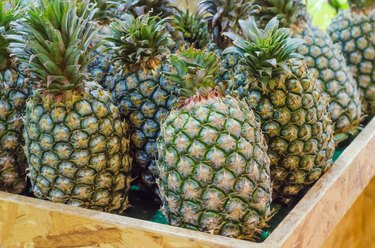
Although it's packed with vitamins and minerals, pineapple doesn't have any special properties that help you to lose weight. When you eat fresh pineapple, you will get some benefit from its fiber content, which helps to fill you up and control overeating. But most of the fiber is removed from pineapple juice, and what's left is primarily sugar. Even though it's natural fruit sugar, consuming too much will cause you to gain, not lose, weight.
The Skinny on Pineapple Juice
Video of the Day
You can probably tell from its sweet taste that pineapple juice is rich in sugar. Just 1 cup of the juice provides 25 grams of sugar, which contribute 75 percent of the 132 total calories. A cup of pineapple juice has about the same amount of sugar and 31 more calories than a cup of cola. The only difference is that pineapple juice offers some vitamins and minerals, such as potassium and vitamin C, that cola lacks.
Video of the Day
The Way to Weight Loss
When you consume a greater number of calories than your body burns through normal physiological processes and exercise, you will gain weight. The only surefire way to lose weight is to reduce your calorie intake below your body's calorie needs. This will be much more difficult if you drink a lot of juice, which offers nothing to help fill up your belly, but provides a lot of calories. To successfully lose weight, you should focus on eating low-energy-dense whole foods that are low in calories and high in water and fiber content and help to fill up your stomach so you eat less.
Fructose and Fat Gain
Pineapple juice is rich in the two types of simple sugars, glucose and fructose, the latter of which may have specific associations with weight gain. According to research from the Yale School of Medicine, fructose may trigger the desire for food and promote overeating. This is because, unlike glucose, it does not promote feelings of satisfaction and fullness after consumption. Therefore, drinking a lot of pineapple juice, which offers little satiation, combined with the effects of fructose, may cause you to consume excess calories and gain, not lose, weight.
Ditch the Juice
Any way you slice it, pineapple is a high-sugar fruit and should be consumed in moderation. You're much better off eating whole fruit than drinking fruit juice. Not only is whole pineapple lower in sugar and calories -- one cup of chunks has 16 grams of sugar and 82 calories -- but it's also a rich source of fiber with 2.3 grams per cup. Stick to a single serving, which is about a 1/2 cup of chunks, and stay hydrated with plain water.
- HealthTap: Does Pineapple Juice Help You Lose Weight
- USDA National Nutrient Database: Pineapple, Raw, All Varieties
- USDA National Nutrient Database: Pineapple Juice, Canned, Unsweetened, Without Added Ascorbic Acid
- USDA National Nutrient Database: Carbonated Beverage, Cola
- Centers for Disease Control and Prevention: Low-Energy-Dense Foods and Weight Management: Cutting Calories While Controlling Hunger
- YaleNews: Study Suggests Effect of Fructose on Brain May Promote Overeating
- The Paleo Diet: Fruits and Sugars